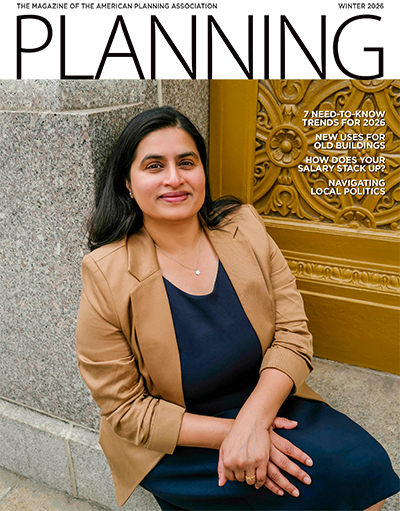June 27, 2024
"Our [compensation] policies have given us an advantage in engagement. It's helped us deepen our relationships with people, build some trust, and kind of reframe the narrative about what it's like to be a good partner in government," says Noah P. Boggess, AICP, a senior public engagement specialist with Puget Sound Regional Council (PSRC) in Seattle. By working closely with the finance team, Boggess and his colleagues have created several compensation policies aimed at making community engagement farther reaching and more sustainable over time.
"When we were able to compensate people, we got a foot in the door and then they could introduce us to other [community-based] groups doing similar work and ... have a conversation with us that we can pay for," Boggess says.
He sat down with Sophia Burns, content associate at the American Planning Association (APA), to share PSRC's strategies for compensating stakeholders for authentic public engagement. This conversation was recorded as part of Short Takes, a miniseries of the APA Podcast recorded onsite during the APA 2024 National Planning Conference in Minneapolis.
This interview has been edited for length and clarity, but you can listen to the complete conversation at planning.org/podcasts or wherever you get your podcasts.
BURNS: Why did PSRC decide to explore ways to pay community members for engagement efforts?
BOGGESS: The goals of our compensation policies are to, of course, get people to engage with us, but also to encourage more thoughtful input by valuing their time, building trust, and establishing contacts, and then hopefully returning to some of those groups and conversations over time.
There's no denying that dollar amounts jump off the page. When people see a $100 gift card being offered, they're going to look closer at our outreach materials and be more interested in having a conversation with us. It's been nice to be able to provide that opportunity to community members.
BURNS: So, how do you go about compensating community members for their time?
BOGGESS: Surveys are our first opportunity for compensating individuals and produce the largest sample size. We usually invite 20,000 people, and if we're lucky, we get a few thousand to complete them. Obviously, we can't compensate everyone, so we tend to utilize a raffle system and select a few winners.
Then, we pull from the list of people who completed those surveys and engage with some of them for interviews, which we also compensate. These direct conversations provide more context and qualitative data, but they're more of a time commitment. So, we compensate each interviewee with a $125 gift card.
One of our newest policies for community-based organizations is designed to build inroads with groups that have been doing community work for a long time. Compensating representatives from these groups for more in-depth engagement allows our agency to work with them as consultants and honor their expertise. We pay them $75 an hour for the interviews.

Noah P. Boggess, AICP, leads young people during the annual Summer Planning Academy. Photo courtesy of Puget Sound Regional Council.
BURNS: What is the most creative way you've implemented this strategy?
BOGGESS: Our scholarship policy is brand new. It's exclusively available to participants in our summer planning academy, a four-day leadership development course for high school students that introduces them to the concept of planning and hopefully provides a pipeline for them to pursue careers in our field. If they complete the program successfully, they're eligible to receive $500 scholarships.
We had a high school student last year who was really involved in our work: we compensated her, got her on board, and she's contributed to events and citizen advisory committees since then. She's now a standing committee member, which is pretty interesting. So, it's just a good way to meet people that are interested and helpful in your work and continue to engage them in some capacity down the line.
BURNS: How has this impacted the way you work with community groups?
BOGGESS: If I have a conversation with a community-based organization, and I'm able to compensate them, then down the line, it's a lot easier for me to come back to them and say, "Hey, can you get me in touch with some of your community members? I can compensate you again, and I can compensate them, too." That relationship building at an organizational level is where we've had the most success.
The direction that we're going is to hopefully have standing contracts with certain community-based organizations. When people get an inroad with us, and we're able to compensate them, it makes it easier to return to them again.
BURNS: What advice would you give planners looking to implement compensation strategies in their departments?
BOGGESS: Planners can look at our engagement reports and see the success that we've had and who we've been able to speak to and how many times over the course of a year we've spoken to them. They should also look at our policies themselves and work to make their own very specific policies for specific situations.
Our policies have given us an advantage in engagement. It's helped us deepen our relationships with people, build some trust, and kind of reframe the narrative about what it's like to be a good partner in government. I encourage everyone to work closely with your finance team. More policies mean more paperwork, but it helps you compensate for very specific tasks. Get creative, ask questions, and you can utilize this to help your engagement practices.




